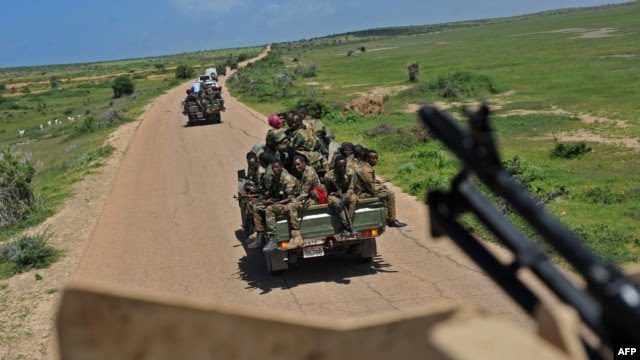The United States and Somalia’s government on Thursday signed a security pact that they presented as a road map toward building a functional Somali army, capable of taking over security responsibilities and the fight against al-Shabab militants.
In a ceremony presided over by Somalia’s President Hassan Sheikh Mohamud in Mogadishu, the two countries signed a memorandum of understanding for the construction of five military bases for Somalia’s National Army.
According to a statement from Somalia’s National News Agency, SONNA, the bases will be for the Danab Brigade, the U.S.-trained elite unit of the army.
“Within several months we are looking forward to reaching the 3,000 Danab personnel target set in 2017. The Danab also is being prepared to take over many of the essential functions required to sustain and grow the force, and it is already taking on a greater responsibility for recruiting and training,” said Molly Phee, U.S. assistant secretary of state for African affairs.
Phee, who was at the ceremony, said the U.S. is supporting Somalia so its army can take on al-Shabab.
“We recognize that reliance on temporary and often inadequate camps hamper the Danab’s preparedness and could represent an obstacle to the brigade’s sustainability and growth,” she said. “Our shared goal is to have the [Somali National Army] exercise full control over base operations when the facilities are completed, and the MoU just provides the blueprint to do that,” she said.
She said the memorandum of understanding for construction of the bases “reflects our confidence in the future of the Danab and the scale of our investment in Somalia’s security.”
Speaking at the ceremony, Mohamud thanked the U.S. government for its support.
“U.S. investments in the SNA/Danab have borne fruit, fueling a formidable strike force that leads the offensives of the forces of Somali security against al-Shabab,” Mohamud said.
The agreement comes at a time when the African Union peacekeeping mission in Somalia, known as ATMIS, is scaling back its presence in Somalia. Last June, the African Union Transitional Mission in Somalia (ATMIS) officially handed over six stations to the Federal Government of Somalia,
The new bases will be associated with the Somali military’s Danab Brigade, established in 2017 following an agreement between the U.S. and Somalia to recruit, train, equip and mentor 3,000 men and women from across Somalia to build a strong infantry capability within the Somali army.
The U.S. is among the largest contributors of support to the Somali National Army, especially for its commando wing, the Danab Special Forces, which is trained for close-range fighting with al-Shabab in urban areas. Last January, the US pledged $9 million in new military aid to help Somalia’s ongoing campaign against al-Shabab militants. It’s the first such direct military support since U.S. forces returned to Somalia and President Hassan Sheikh Mohamud announced an “all-out war” against the militants.
The brigade has been pivotal as a quick-reaction force in efforts to repel the extremist group al-Shabab.
The U.N. Security Council has authorized the reduction of the peacekeeping force in Somalia, and the Somali government says it is achieving progress in improving security. But al-Shabab continues to carry out sporadic attacks across Somalia, including in public places. The group’s latest attack, an incident inside a military base in Mogadishu, killed four Emirati troops and a Bahraini military officer.
Last December, the United Nations Security Council voted to lift the arms embargo on Somalia’s government and its security forces, ending more than 30 years of restrictions on weapons deliveries to the Horn of Africa country. The council adopted two British-drafted resolutions on Friday, one to remove the full arms embargo on Somalia and another to reimpose an arms embargo on Al Qaeda-linked Al Shabaab militants, who have been fighting the Somali government since 2006.
The move is aimed at strengthening the Somali government’s ability to combat the Islamist insurgency and restore stability and security in the country, which has been mired in civil war and chaos since the overthrow of dictator Mohamed Siad Barre in 1991. The council also expressed concern about the lack of safe ammunition storage facilities in Somalia and urged other countries to help the Somali government construct, refurbish and use safe ammunition depots across the country.
The signing of the memorandum of understanding comes as tensions in the Horn of Africa simmer over a January 1 deal between Somaliland and Ethiopia. The deal would grant Addis Ababa access to the Red Sea in return for the possible recognition of breakaway Somaliland.
Somalia’s federal government vehemently criticized the deal, saying it would infringe on the country’s territory. Somaliland has operated independently from Somalia since 1991 but is not recognized by any other nation.
Last week, the Turkish and Somali defence ministers signed a defense and economic cooperation agreement to enhance relations.
During a visit to Cairo this week, Turkish President Recep Tayyip Erdogan said that Turkey has defense agreements with Libya, Somalia and Sudan, and that Ankara stands for maintaining the sovereignty and territorial integrity of these countries.
In January, after news broke of the Ethiopia-Somaliland deal, President Abdel Fattah el-Sissi of Egypt said, “Egypt will not allow any threat to Somalia.”




